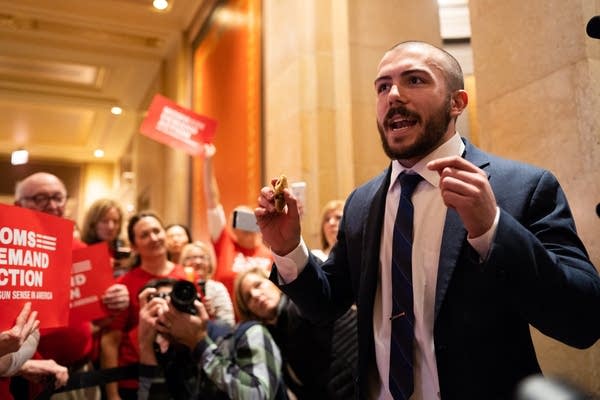Young and focused: Cantrell aims to engage, represent, inspire his peers

Go Deeper.
Create an account or log in to save stories.
Like this?
Thanks for liking this story! We have added it to a list of your favorite stories.
State Rep. Hunter Cantrell is used to answering questions about his age.
At 23, the Democrat from Savage — who took office earlier this month — is the youngest member of the current Minnesota Legislature. Many of the 200 other state lawmakers are more than twice his age.
But Cantrell, who also represents parts of Burnsville, is most interested in talking about his work. "One of the first bills that my colleagues and I introduced is a bill to ban the incredibly harmful and roundly discredited practice of conversion therapy in the state of Minnesota," he said during an interview Saturday in his office.
Cantrell is openly gay; he said he got his start in politics at 17, working to stop a proposed state ban on same-sex marriage.
Turn Up Your Support
MPR News helps you turn down the noise and build shared understanding. Turn up your support for this public resource and keep trusted journalism accessible to all.
A couple of weeks into the legislative session, Cantrell's office is still empty. Cantrell laughed about the big, empty office, saying he has been focused on drafting legislation and getting right to work.
"That's definitely a work in progress. ... I have about three plants and a bag of almonds in my office, so the decor is definitely coming along," he joked.
Despite his age, Cantrell said he hasn't felt intimidated in the Legislature. His focus remains squarely on the public.
"I've spent a lot of time over the last year-and-a-half, especially, listening to people's stories and the struggles that a lot of people are facing," he said. "That's just incredibly empowering."
Cantrell's love for politics is something he said he hopes will rub off on other millennials.
"We need to make sure that our Legislature is reflective of the whole spectrum of concerns and difficulties that folks experience in our state," he said. "I think that the voices of young people are an essential component of that."
But Hamline University political science professor David Schultz said there is likely a long way to go before young people have representation that reflects their numbers.
Schultz, who studies generational politics, said people in the baby-boom generation have greater representation in elected office. Meanwhile, he said millennials are lagging in voter participation.
"All they've ever seen is the toxicity in Washington in terms of partisan divide," Schultz said. "What we're seeing is that they seem more turned off by conventional politics than we've seen compared to the previous generation."
State records show that decades ago, it was more common for people younger than 30 years old to serve in the Legislature. But since 1985, the number of lawmakers in their 20s has been in the single digits each session.
Schultz said that may be because many young people today may not be able to afford a run for office — especially if they have student loans. "To run means you're not going to work or you have to work less. They're just not in a great situation to do that," Schultz said.
Schultz also said the cost of running for office has dramatically increased in the past 20 years.
He said that nationwide, people younger 30 years old are on track to become the largest generational voting block in American history. They will be deeply influential — if they vote in strong numbers.
Cantrell said he hopes to engage more of those young people. But he also hopes he can connect to all Minnesotans through his experiences.
He has already lived through a battle with cancer, surviving stage 2 Hodgkin's lymphoma.
"I went through several months of chemotherapy in 2017 ... and there came a point in October where I was hospitalized for nine days and almost lost my life to a nearly fatal reaction to one of my chemotherapy drugs," Cantrell said. "It was after that that I decided, every day after that is a bonus day."
Cantrell graduated from the University of Minnesota. He is serving on three House committees — Health and Human Services Finance Division, Judiciary Finance and Civil Law Division and Capital Investment Division.


